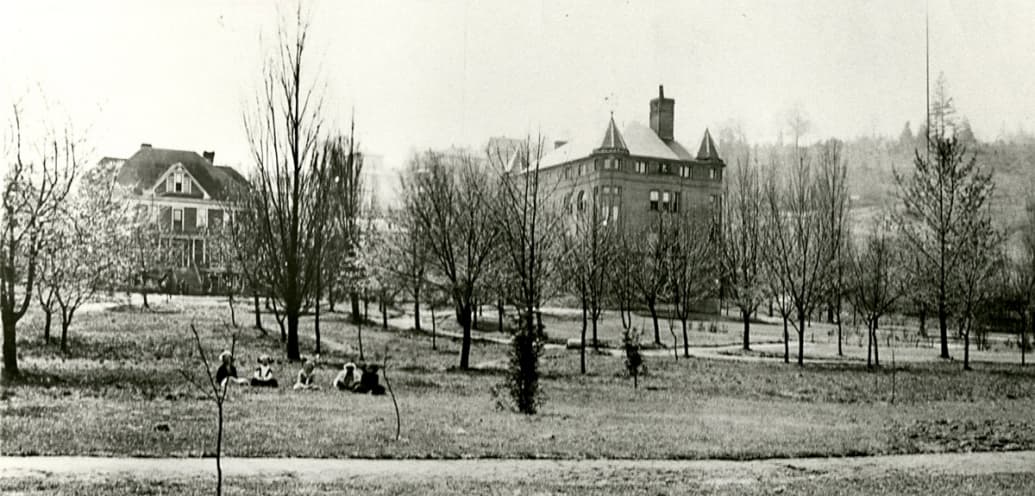Seattle Pacific University has deep roots in the Pacific Northwest.
We were founded in this valley upon a 5-acre garden plot donated by Nils and Karen Peterson. As the Petersons stood atop Queen Anne Hill and looked over this valley, they chose their garden as the site for our university. Our campus as you see it today was brought forth by thousands of men and women who believed in our purpose and capacity.
SPU’s deep roots in faith and place come to fruition in our students and alumni. They are people who can interpret today’s complexity and recognize the gaps, inequities, and needs of our world, and then imagine how life could — or should — be, and work toward that end. They seek change that brings shalom, human flourishing, wholeness, and harmony, and extend God’s garden throughout the world.
One of our challenges as a university, this year and every year, is to embody and extend that promise to our student community.
We are called to be faithful and to reflect the character of God.
We are called to love, justice, mercy, and truth; to reflect the optimism of grace. We are called to do so within our context, theologically, institutionally, and geographically, in Seattle, the Pacific Northwest, and around the world.
The news this year has been full of stories about the terrible events that occur when people follow ideas and ideologies that have a lasting, destructive impact on communities and people at deep levels. These evil ideas co-opt the Christian faith; they do not ring true to my understanding of the life and values that Christ calls us to live.
This was never more evident to me than in the events of Charlottesville on August 17, 2017.
As I watched the aftermath of the heinous and cowardly act that took the life of Heather Heyer — an act intended to perpetuate, embolden, and further the hate, lies, and falsehoods of white supremacy — I grew increasingly disturbed in my heart and life.
Our country’s leaders, from the president down to the community level, including higher education leaders, should work together to stand for truth.
We should call for all people to tear down the wall of hate, the wall of division, the wall of white supremacy, and allow truth to shine on its evil intent and presence. We must tear down the wall of our nation’s racist legacy.
We as a university are dedicated to shining a light on the truth discovered in the Gospel of Jesus Christ — the proclamation of God’s action in the world, the coming of God’s kingdom, manifested in the ministry, death, and resurrection of Jesus. Our Christian identity grounds us as a university and provides the foundation for all of our interactions with each other, our neighbors, and the world.
As we move past our 125th anniversary, this is a perfect moment to affirm and ensure that our identity in Christ is as foundational in the future as it has been in our past. Our Christian faith commitment is clearly articulated in our statement of faith, which affirms that we are orthodox, evangelical, Wesleyan, and ecumenical. Our emphasis on faithfulness to God, on reflecting his character, is not new to SPU or our sponsoring denomination, the Free Methodist Church. B.T. Roberts, the denomination’s founder, believed it was the Church’s mission to embody and enact Christ’s love in our individual lives, paying special attention to the disempowered in our society. It is for this reason that we at SPU begin our year with CityQuest, serve our community throughout the year, and will host Tent City 3 again this fall and winter.
We are called to seek the welfare of the poor, the marginalized, and the oppressed by building bridges of love, respect, value, and reconciliation. We must work to foster educational equity and produce economic opportunity for all to advance and pursue their hopes and dreams.
One way we as a university are working to do that is by seeking to develop and broker action that will create a permanent solution for our students who are threatened by President Trump’s call to end the Deferred Action for Childhood Arrivals program, which shields young undocumented immigrants from deportation.
DACA has allowed thousands of undocumented young people, including several of our current and new students as well as alumni, to gain temporary immigration protections to be able to work and study in this country. At Seattle Pacific, these students are an important part of our community and make us a better institution by their presence. The SPU administration is committed to making our campus a welcoming place for these students and all in our community.
For our campus, I reiterate my call to prayer as we seek God’s wisdom for how our community might extend our multifaceted work in the area of reconciliation, including recent efforts such as the design and implementation of the Cultural Understanding and Engagement curriculum.
Through the summer and into the fall, we gather on Mondays for community prayer, praying for the healing and reconciliation of our nation. I invite you to join us from wherever you are by praying the prayer to the right.
It is my hope that in these moments, God will impress upon us how we might best embody God’s love in our relationships with others, both individually and corporately. May we search for the truth, be guided by the truth, and live the truth, so we might share the truth.




